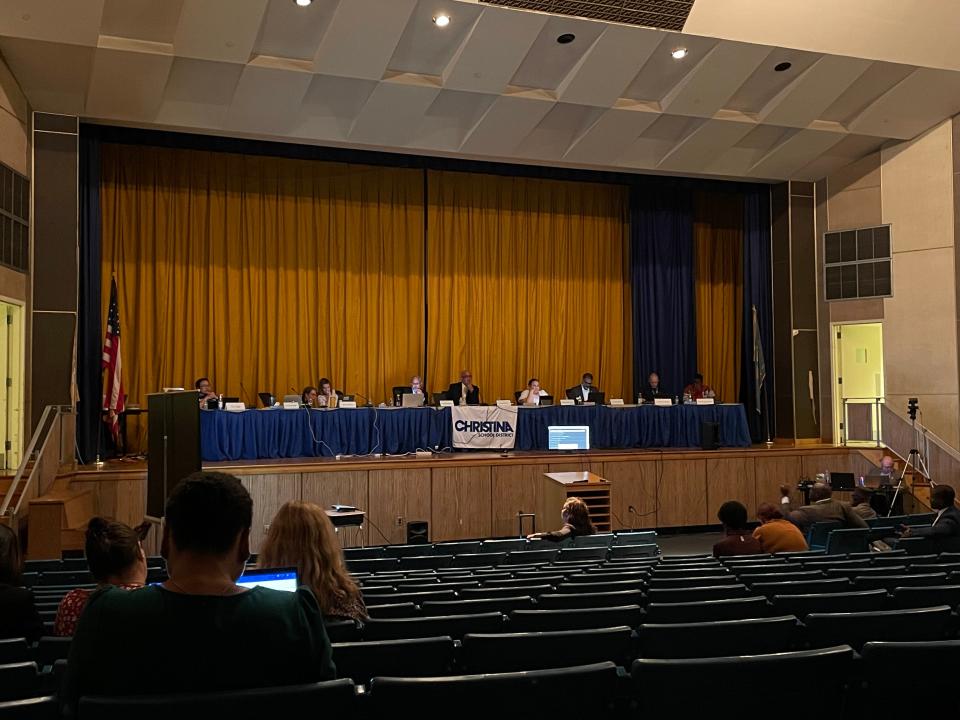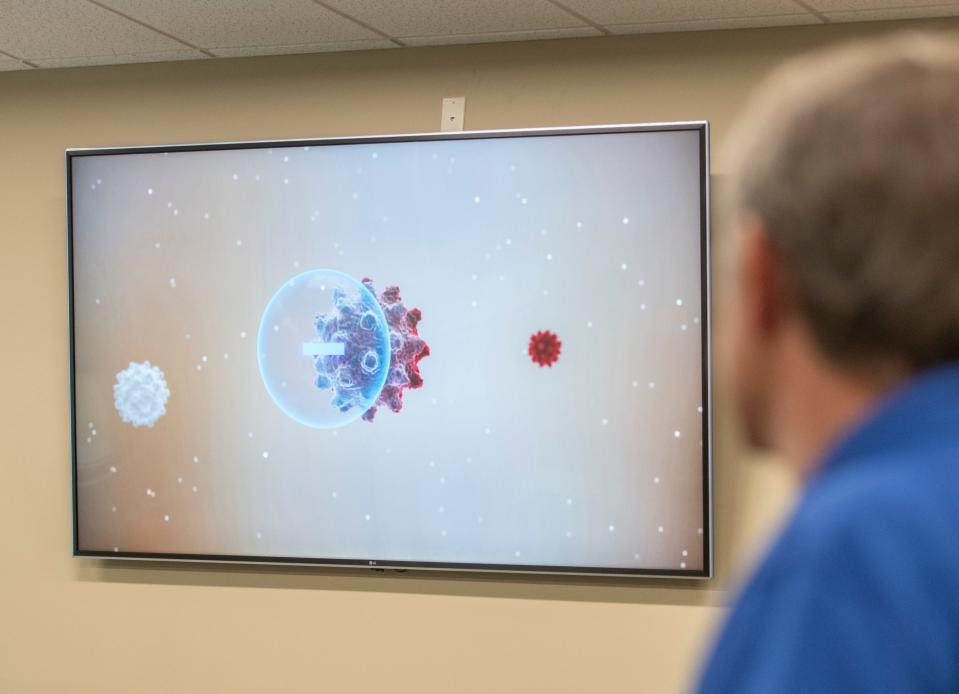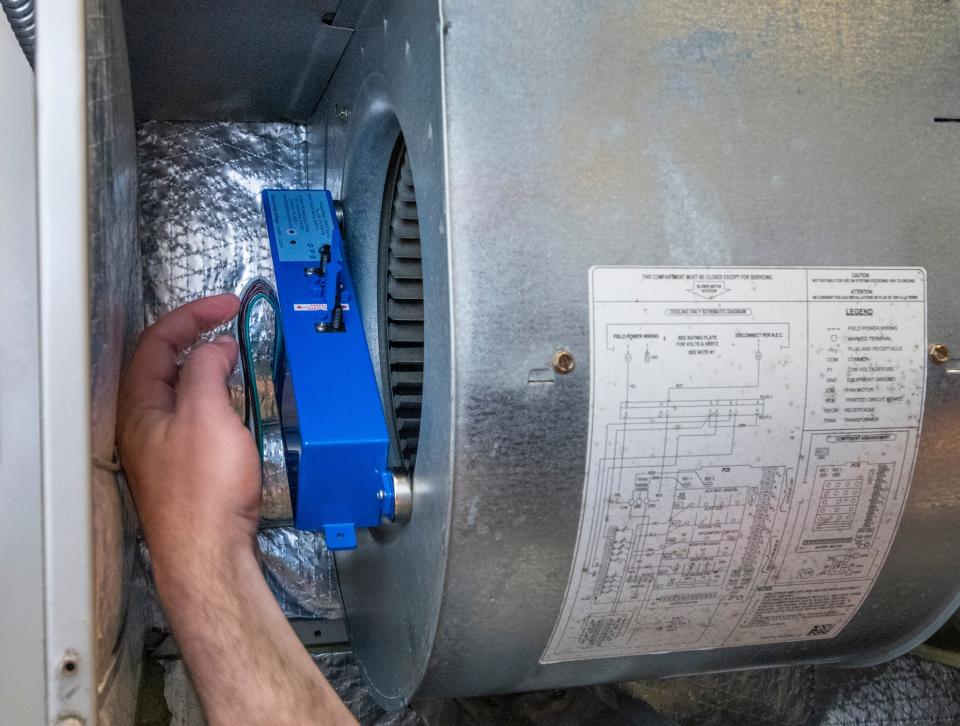Christina schools spent millions on air ‘sterionizers.’ Nationally, the tech has been questioned
A small group of parents has moved to question air purification strategies in Christina schools, particularly new additive air filters placed in every school in COVID-19 response. District officials have remained resolute in pandemic decision-making.
One expert, invited to Tuesday night's school board meeting by a district parent, spoke for some 17 minutes in public comments. Typically, someone can speak for three.
“I've been asked to speak to you about indoor air quality with a focus on infectious aerosols,” said Larry Schoen, the building services engineering consultant and fellow with American Society of Heating, Refrigerating and Air-Conditioning Engineers, preparing to lead board members through a basic overview.
Schoen's presentation didn't gain much attention in the auditorium. But here are some basics on why the matter has been brought up, echoing national debate sparked in pandemic peak.
Why is anyone talking about Christina's air quality?

Christina purchased additive air cleaners, or “sterionizers,” for all of its schools by 2021, as it directed $25.5 million in ESSER funds pledged to improve air quality.
This technology promises air purification though bipolar ionization, releasing charged ions into the air to kill viruses and mold spores.
Nationally, advocates have warned devices like these are “often unproven” in efficacy and potentially release pollutants themselves, as the Lancet COVID-19 Commission cautioned in 2021. The White House also released guidance that such devices using bipolar ionization “are NOT recommended at this time,” citing concern of ozone production.
A small group of parents, primarily led by one district father, Matthew Clifford, looked to demand attention on the issue Tuesday. Clifford, however, was unable to speak over Zoom during public comment. It would have marked over three times he's spoken on the issue while connecting with the board.
Regardless, Christina officials remain confident in their devices.
George Wicks, district supervisor of facilities and planning, contends the bipolar ionization air filters are safe and effective, enhancing other HVAC updates throughout the district. A report from Batta Environmental Associates testing in December 2022, provided to Delaware Online/The News Journal, showed no detectable ozone in one outfitted elementary school, West Park Place. More data on the devices’ effectiveness is hard to come by.
Wicks said ozone was his first concern when engaging with the distributor, Eagle X Pro.
“We verified that they were safe, they were not producing ozone,” Wicks said, noting the tech meets other updates in schools, alongside other portable filters. “So we feel like we've tested, we’ve done our due diligence.”
Any conclusion may be left to gray area. But the question could also remain as to whether district tax dollars may have gone toward a more proven, tested method of air purification.
Education roundup: UD sees record applications for a 5th year. Freshman class gets smaller
So what is a sterionizer?

Wicks has sterionizers placed on HVAC units in some 40 buildings and 32 schools.
He said these air purifiers release energized particles, or ions, pulling hydrogen atoms out of molecules and destroying the cells of viruses and mold spores. It’s the same technology deployed throughout the Delaware Department of Correction and some other schools in the state.
“That will basically destroy the virus’ cells and also do the same thing to fungi, molds, mildews, any kind of single cell thing these ions will attack,” Wicks said. “It's basically being dispersed throughout the whole classroom, from the supply side, and that protects everyone.”
This is complex technology. Some experts question what else is released.
In 2021, a Kaiser Health News investigation found more than 2,000 schools in 44 states had installed these types of additive filters. School officials across the U.S. were persuaded by salespeople, according to that investigation, to spend on products that many scientists believe aren’t substantially more effective or thoroughly studied.
That same year, the New York State Education Department issued a statement asking that school systems "please refrain from applying ionization technology until further independent studies show that a particular manufacturer’s product will not generate harmful byproducts."
While variations of these technologies have been around for decades, according to the CDC, "They have a less-documented track record when it comes to cleaning/disinfecting large and fast volumes of moving air within heating, ventilation and air conditioning (HVAC) systems or even inside individual rooms." And with the absence of "an established body of peer-reviewed evidence," the technologies are still considered emerging.

Academic air quality experts have also called out a lack of sufficient research to show these devices are more effective than mainstay strategies — like getting more outside air pumped into classes, MERV 13 filters in heating systems and portable HEPA filters.
“Me and many of my colleagues say use extreme caution if using these electronic filters, because of these risks,” said air quality expert Larry Schoen Tuesday.
So what's next? That's unclear.
Christina board members thanked the speaker for his comments, having several hours of agenda left in front of them. These concerns didn't seem to resurface as the meeting pressed forward.
This article originally appeared on Delaware News Journal: Parents challenge air quality control measures in Christina schools

